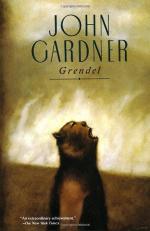|
|
Grendel Topic Tracking: Identity
Topic Tracking: Identity
Chapter 1
Identity 1: Grendel wants to force the men to accept his version of reality--life is meaningless, so it doesn't matter who lives or dies--but he only succeeds in pushing them away from him. He kills some of them, and the rest hate him, but are even more committed to their traditions and communities than before. He wants to drive them apart, but he cannot, and he wants to hate them, but also wants to be with them.
Chapter 2
Identity 2: Grendel looks back on his young days with the perspective of a thoughtful adult. He sees himself as a completely different creature now. He can laugh at his innocence, see his relationship with his mother developing, and understand how he has matured.
Chapter 3
Identity 3: Grendel is confused by the soldiers' behavior. He is disgusted by their pettiness, their brutality, and their wastefulness, and these things seem completely alien to him. Yet he also speaks their language, and something draws him to their town over and over, as much as he wants to avoid it.
Chapter 4
Identity 4: The Shaper has the power to change Grendel's identity. Grendel never thought of the world in terms of Good vs. Evil, and certainly never thought of himself as an evil force, but after listening to the Shaper's description of him as the "dark side," he is ready to believe it.
Chapter 5
Identity 5: The dragon tries to simplify Grendel's life by convincing him that his worries are ridiculous: he shouldn't wonder about whether killing people is "right" or "wrong." There's no such thing as morality. Grendel has a vague idea that the dragon is wrong, but he is also very drawn to what the dragon tells him. The dragon wants to turn Grendel into an unthinking beast, and he partially succeeds: after their meeting, Grendel is much more willing to murder people.
Chapter 6
Identity 6: Interestingly, as Grendel becomes more powerful, he also becomes more alone and more unhappy. Clearly, though he hated the villagers in some ways, he also wanted to interact with them. Now, he does not even have the opportunity to fight them: he simply takes a few victims and leaves. He pretends that he enjoys this, but he knows that his new power is not necessarily a positive one.
Identity 7: Grendel takes control of his own identity for one moment, arguing relatively rationally with Unferth until he finally forces the man to see that heroism is not so simple as he thinks. He contrasts himself with both the Shaper and the dragon, two figures who have been warring in his mind for some time. Though Grendel does not really establish his own philosophy of life--he remains confused throughout the book--he recognizes this point as a small triumph (for himself, if not for Good.) He says that the apple fight was the most enjoyable battle of his life.
Chapter 8
Identity 8: Grendel's confusion about who he is continues. He sees himself as immensely powerful--he has made Hrothgar who he is today--but at the same time, he has no concept of why he does what he does. He tries to say that he does it because he is a monster, but he knows as well as the reader that that is only partially true. Grendel may have an instinct to kill, but he also has the power to decide whether or not to indulge that instinct. He tries to reject that power by claiming that he is at the mercy of his instincts. Still, he seems to know that this idea is questionable, because he talks about it in vague terms and then contradicts himself the next moment.
Chapter 9
Identity 9: Grendel seems to be seeing something of his future in the death of the deer. Perhaps he sees himself as a pawn in a game as well: he never quite understands why he tortures the Danes, and yet he cannot seem to stop. He is in some respects like the deer, which seems to have a single purpose in life: to be killed by the hunter, just as the hunter's single purpose seems to be to kill the deer. Grendel comments that they appear to exist because of each other, an idea he has hinted at in reference to his own relationship with Hrothgar. Hrothgar has made Grendel into what he is today, and the opposite is true as well. Their identities are dependent on each other, and their actions seem planned from the beginning. This may be Gardner's way of showing the reader that his story takes place in the same world as Beowulf, and therefore the characters must act the same way, with the same results. It was the deer's destiny to die, just as it is Grendel's destiny to torment Hrothgar and be killed by Beowulf.
Chapter 10
Identity 10: When Grendel describes the goat as climbing because it is in his nature to climb, he hints at his own nature: he throws rocks at the goat because it is his nature to throw rocks, both literally and figuratively. The goat keeps climbing, even after it is dead, and Grendel keeps throwing rocks.
Identity 11: Grendel's identification with Beowulf is so strong that even his mother can feel it. It's in the air: something is coming that will have a great effect on Grendel. One could say that Beowulf is Grendel's destiny. He cannot avoid it; all of his protestations that he creates his own reality are useless.




